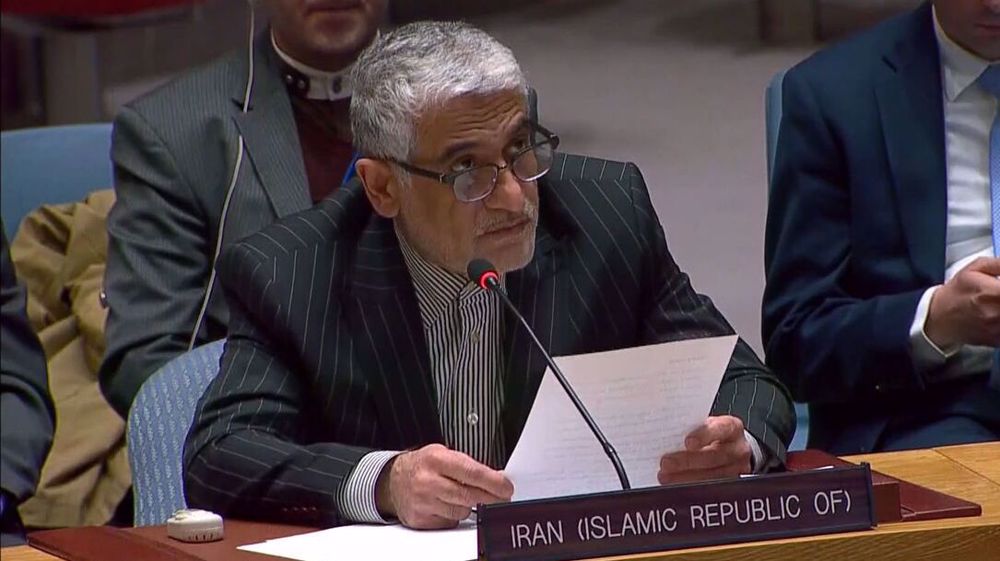AhlulBayt News Agency: Iran urges immediate and unconditional removal of Western sanctions against Syria as means of helping Damascus ride out the aftermath of the hugely deadly and devastating earthquake that hit the Arab country earlier this month.
The Islamic Republic's Ambassador to the United Nations, Amir Saeed Iravani, made the remarks before a UN Security Council meeting on the situation in the Middle East on Tuesday.
The temblor that hit the country and neighboring Turkey on February 6, has so far killed more than 50,000 people on both sides of the border.
The disaster "has exacerbated the [Arab] country's already dire humanitarian situation, collapsing structures and basic services and severely affecting people's ability to meet their basic needs," Iravani said.
"Given the severity of the situation, humanitarian assistance must be scaled up and provided in an impartial and non-discriminatory manner, free of politicization or conditionality to ensure that the most vulnerable individuals receive the assistance they require," he added.
"In order to more effectively address Syria's current humanitarian crisis, the international community must focus on lifting the inhumane unilateral sanctions."
Syria has been a target of United States sanctions since 1979. The US and its Western allies imposed more such bans on Damascus after 2011, when the country found itself in the grip of rampant foreign-backed militancy and terrorism. The coercive measures intensified even further with Washington's passing of the Caesar Act in 2019, which targeted any individual and business that participated either directly or indirectly in Syria's reconstruction efforts.
The Iranian envoy reminded that the Western measures amounted to blatant violations of international law and the UN Charter, adding that the sanctions had made it more difficult for the Syrian people to access their needs and have constrained the ability of government institutions to deliver basic services and improve living standards.
In the face of overwhelming international criticism, the US moved on February 10 to issue a temporary sanctions waiver to allow earthquake relief funds to reach Syria.
Iravani, however, asserted that the exemptions were not sufficient, calling them "only an attempt to create the appearance of concern."
"Therefore, it is not enough to offer words of solidarity without taking concrete actions. We call for the immediate, complete, and unconditional lifting of these unjustified sanctions," he remarked.
The ambassador also condemned the continued plundering of Syria's natural resources, primarily oil, and gas -- a trend that American occupation forces started under former US President Donald Trump -- at a time when the Arab nation could use every last bit of its national wealth.
Iravani cited Syria's official statistics that have shown that such "criminal acts" had resulted in the theft of more than $100 billion in Syrian national resources and wealth.
Turning to the issue of ongoing efforts at returning peace to the Arab nation, he noted that Iran would continue its endeavors within the "Astana format" to help "achieve long-term and sustainable normalization in and around Syria."
Since 2017, the Kazakh capital has been hosting many rounds of talks between the Syrian government and the opposition with Iran, Russia, and Turkey serving as the process's guarantors.
In conclusion, the Iranian envoy condemned the Israeli regime's most recent attacks on Syria that targeted a residential building in a densely-populated area in the capital Damascus on February 19.
He denounced the offensive as a "heinous attack" that functions as "a grave threat to regional peace and stability," saying the international community had to compel the Israeli regime to stop its repeated violations of Syria's sovereignty and territorial integrity.
At least five people, including a soldier, were killed and 15 others wounded in the Israeli airstrikes. Many of the wounded are in critical condition, and many residential homes in the Syrian capital and its countryside were damaged.
/129
1 March 2023 - 06:22
News ID: 1349734

Iran urges immediate and unconditional removal of Western sanctions against Syria as means of helping Damascus ride out the aftermath of the hugely deadly and devastating earthquake that hit the Arab country earlier this month.
